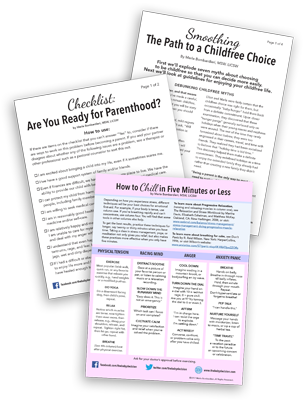.
Q: “How Do We Tell Our Parents We’re Not Having Kids?”
…
Twelve Tips for the Big Conversation:
…
Do your parents’ dreams of rocking a grandchild in their arms completely ignore your personality and desires? It won’t be easy to dash those dreams, but you may decide to tell your parents because secrets can make conversations awkward.
If you expect the conversation to be difficult, brainstorm it with your partner, trusted siblings, friends, or a therapist or coach. Obviously, don’t talk to a sibling who can’t keep a secret.
Although your parents’ response might be negative, don’t give up hope. They may support you once they understand your rationale have a chance to get used to the idea. Remember that it has taken you a while to decide to be childfree. They, too, may need time to absorb the information. They may not want you to miss out on what they consider one of life’s great pleasures. Listening to you, they may come to understand that parenthood wouldn’t be a pleasure for you. And as they see you happy and productive in your life without kids, they will probably accept your choice.
Feel free to pick and choose what makes sense to you in light of your and your parents’ personalities and communication styles. Consider whether you’ll tell them on your own or with your partner. Although you’ll probably include your partner in later conversations, the first conversation may go better without them, especially if you have agreed to be childfree at your partner’s request.
1. Determine your goal.
Do you have a relatively good relationship with your parents? If so, you will probably benefit from telling them. This will save you from a barrage of questions, or if they’re not asking, clear any tension in the air. You will bring them up to date on what matters to you. That will probably foster good communication.
If you don’t have a good relationship with them, you may want to keep your distance. It may be easier not to tell them, if they aren’t asking. If you think they will be nasty or try to shame you or otherwise make you miserable, if you can’t imagine having a mutually respectful, empathic conversation, you might keep quiet. If they are asking, you can keep saying, “we haven’t decided” or “maybe later.” As you get older, they may stop. But if their asking is annoying, and you do want to have at least a cordial relationship with them, you might decide to tell them.
2. Consider the timing.
Make sure it’s the right time for you and for them. Have you fully settled in with your decision? What about your partner (if you have one)? Are you confident enough to deal with your parents’ reactions? If you decided very recently, you may need to wait a little. If being childfree was originally your partner’s preference, you may also need more time.
Is it the right time for your parents? Are they struggling with a crisis such as bad medical news or other problems? If so, you might wait till things have settled down a bit for them.
3. Try to keep the conversation current, adult-to-adult, and focused on your respect and concern for them.
Try to catch and stop yourself if you and your parents slip into old parent-child patterns you thought you had outgrown. Rehearsing in advance with your partner, a supportive sibling or a therapist could help.
4. Empathize with your parents’ feelings of disappointment, hurt, and anger.
They may try to change your mind or guilt trip you. You may all be angry. But you can offer each other compassion, understanding, and authentic conversation. Let them mourn. You are taking away what they had believed was their “right” to expect grandchildren. Grant them the right to their reactions. Tell them “I can understand why you feel that way.” “I’m sorry to disappoint you.” Although it will be unpleasant, let them talk about their sadness, their visions of you as a parent. Hard to listen to, but if do, your parents will be more likely to listen to you.
5. Teach them about the childfree choice.
Their lack of knowledge is understandable. The general public is only beginning to learn about this choice as more people speak up, write books, report research, and offer role models and advocacy. Ask them to try to accept your choice. Tell them why you made it. Describe what appeals to you about this plan and your positive vision for a meaningful life. Your parents will be less likely to try to change your mind if they know how much deliberation has gone into your decision.
6. Find some passages in The Baby Decision or other readings on the childfree choice.
Share with them what you’ve learned online or from talking to other childfree couples. If you have discovered role models, tell them about them.
7. Help them find nurturing alternatives.
If they already have other grandchildren, or if you have siblings who might eventually have children, remind them of this. Try to help them find other ways to get involved with children. But don’t bring this up right away. In the future, if you think they might be receptive, gently and tactfully suggest that they consider:
- Becoming substitute grandparents to a family whose “real” grandparents have died or live far away.
- Becoming special friends to the children or grandchildren of their friends and neighbors.
- Volunteering at a daycare center or a Big Brother or Big Sister program.
- Spending more time with existing grandchildren even if it means traveling to another city.
8. Help them unload their guilt.
Your parents may feel that they are somehow at fault. They may worry that you’ve made this choice because they were rotten parents or soured you on family life. Or they may think you’re rejecting them and everything they stand for. To counter this, let them know your positive reasons for remaining childfree. Tell them there’s no reason to feel guilty. Of course, they made some mistakes — who doesn’t? But make sure they recognize that you’ve made the decision because it’s right for you, not in reaction to them (assuming this is true).
9. Get them to take pride in your generativity.
They won’t have grandchildren, but they can share, enjoy, and applaud your accomplishments. If their values, courage, or example led you to any of your chosen commitments, point this out so they can identify more fully with your choice.
10. Realize that the relationship between your parents and your partner may change.
If your parents believe (accurately or not) that your partner is more committed than you are to the childfree choice, they may resent him or her and say, “If only my child had married someone more traditional. That awful son-in-law [or daughter-in-law] led my child astray.” Counter by describing your active participation in the decision and giving them a chance to vent their feelings. This may smooth over the relationship.
11. Tell them — if it’s true — that you value them more than ever.
Whether your relationship with your parents is terrific or just mediocre, their importance to you may increase after you’ve made your decision. More than ever, the family ties you already have could bring some joyful connections into your lives.
12. Don’t think that you’ve talked to your parents if you’ve talked to only one.
You may decide to tell the more supportive parent first, but consider telling the other parent yourself, after that first conversation. That second conversation shows respect, gives that parent a chance to respond to you and maybe even support you. This also cuts down on misunderstanding and inaccuracies.
Good luck!
…
Share your experience.
..
What was it like to tell your parents? Do you have advice for our readers? Comment on Twitter, Instagram and Facebook.
For more ideas about coping with pressures to become a parent, see the “In and Out of the Pressure Cooker” chapter of The Baby Decision.
This post was adapted from The Baby Decision by Merle Bombardieri, MSW, LICSW copyright 1981, copyright 2016.


